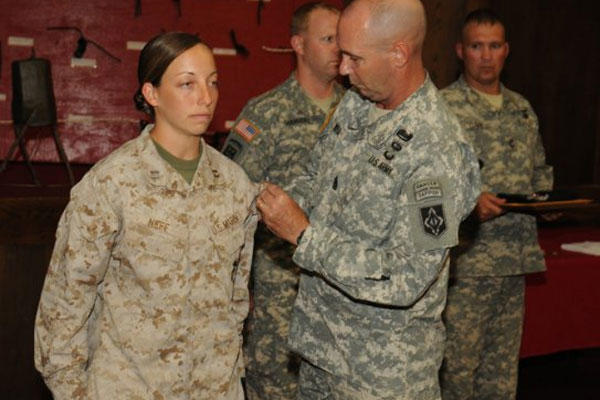FORT LEONARD WOOD, Mo. -- The Sapper Leader Course has been molding superior Army engineer leaders since 1985. Now, Marine Capt. Kathryn Neff has put her mark on the elite school's history -- not once, but twice.
According to Capt. John Chambers, Sapper Leader Course chief of training, Neff is the first female Marine to graduate the course and the first Marine to be the Sapper Spirit Awardee -- the student who obtained the most points during the class, graduating with honors.
"To be the honor graduate you have to be a first time "go" on everything, and she had the highest points total. She stood out in several events," said Master Sgt. Jeremiah Gan, Sapper Leader Course chief instructor. "She earned her place. She is going to have some bragging rights when she gets to her next unit."
Neff was the only Marine in a class of 37. Of them, 31 completed the course and only 14 graduated with five of them going straight through -- meaning those five students passed all of their tests the first time.
"It's an honor to be in the premier Army engineer school. My class was filled with exceptional Soldiers, it felt good to do well among my peers. Out of 1,000, points I had the most -- I was shocked," Neff said. "I'm proud to represent the Marine Corps -- not so much as a female, but as a Marine."
Females were first allowed in the Sapper Leader Course in 1999. Neff and one other female Soldier graduated on Sept. 21, making them the 53rd and 54th females to successfully pass all of the course's tests.
Chambers said Marines have been attending the course since 2000, but it officially became part of the Interservice Training Review Organization in 2010.
As a combat engineer officer for the Marine Corps, Neff first heard about the Sapper Leader Course earlier this year while attending the U.S. Army Engineer School Captains Career Course at Fort Leonard Wood.
"It sounded like a great challenge," Neff said.
Gan started teaching the course earlier this year. He said Neff was the first Marine he has had in class, and he was very impressed by her superior performance.
"She did outstanding. She is very physically fit and has a good demeanor about her. She took everything with a tad bit of humor, so she fit right in with the other engineers on Fort Leonard Wood," Gan said. "As the only Marine in the class, she grabbed a hold of that and ran with it."
She might not be the biggest and strongest Sapper, but at 5'2" and 130 pounds, Neff proved size doesn't matter.
"She was a very good swimmer. I actually graded her physical fitness test and she blew it out of the water," Gan said.
Being that Marines are trained to be amphibious, it's no surprise that one of Neff's favorite days during the 28-day Sapper Leader Course was Waterborne Operations.
"The water was a great time. It's an awesome team building exercise. It was hot that day, so even though it was challenging we were having a good time," Neff said.
Even though she enjoyed the aquatic challenges the most, she said everything she did during the class was important. She said she was challenged mentally and physically in the General Subjects phase and the Patrolling phase. She was certain she left the Sapper Leader Course a better leader.
"We were tired, hungry and stressed, but if you really want it you still want to be there," Neff said. "Actually getting to lead a patrol was awesome. I really found out I have what it takes to be in charge and make a mission happen. It helped me to think clearly under pressure when I was exhausted. All of the other students were exhausted as well. I had to make them want to work for me."
Neff said ITRO is important, because it teaches the individual branches of the military about their differences and how they can complement one another. Even though Marines can't wear the respected Sapper tab on their uniforms, Neff believes that Marines can benefit from the Sapper Leader Course in other ways.
"The Army engineers are very similar to Marine engineers," Neff said. "It's helped me become a better leader, and I learned how other engineers work. I think it makes me better understand how to use my Marines and how to lead them into the fleet."
Gan was happy to report that two more Marines are headed his way in the next cycle.
" Currently, we have a Marine Corps instructor in our course. The more Marines that come through the course and the more visibility they get, the more likely they are to take the course. I think it's great," Gan said.
Neff wishes more of her fellow Marine engineers would take advantage of the prestigious course.
"It's not as well known as it should be. We need to get the word out," Neff said.




























